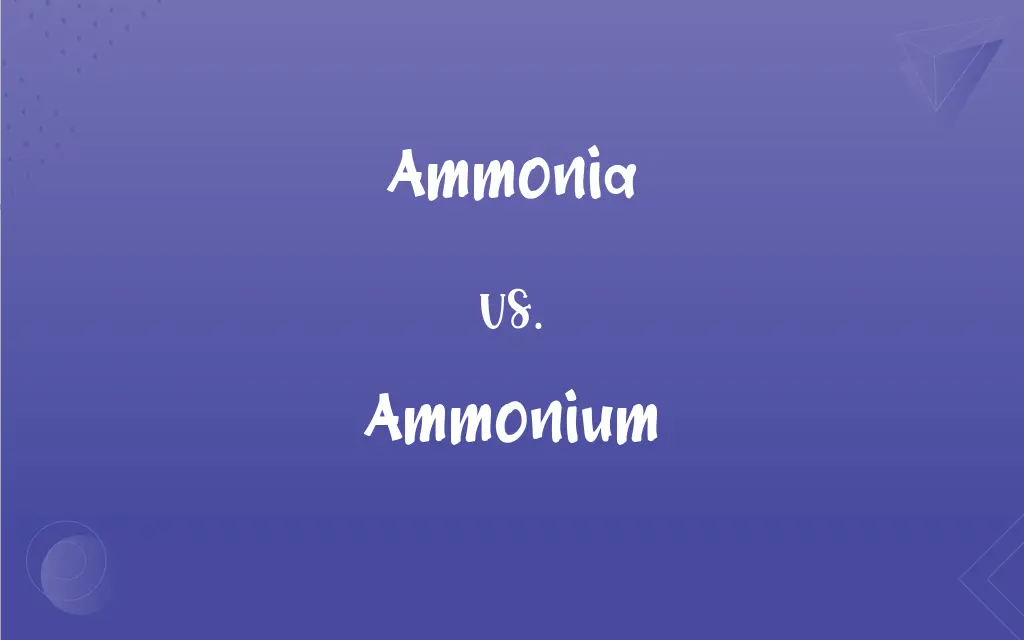Ammonia vs. Ammonium: What's the Difference?
Edited by Aimie Carlson || By Janet White || Updated on November 1, 2023
Ammonia is a gas (NH3), while ammonium (NH4+) is its ionized form, usually found in compounds.

Key Differences
Ammonia, a colorless gas with a pungent odor, is composed of nitrogen and hydrogen (NH3). Ammonium, its cation form (NH4+), exists only in association with other atoms or molecules.
Ammonia is a common industrial chemical, particularly used in fertilizers. Ammonium is often found in salts and minerals, vital for plant nutrition as it's more easily absorbed.
Ammonia can be hazardous, causing irritation and burns. Ammonium salts, conversely, are typically safer, though their safety depends on the anions they're paired with.
Ammonia, being a gas at room temperature, is used in refrigeration systems. Ammonium compounds, however, are used in an array of products, from cleaning agents to explosives.
The presence of ammonia can alter the pH of a solution, making it basic. Ammonium, particularly in the form of ammonium hydroxide, can also affect pH but tends to create a less basic environment.
ADVERTISEMENT
Comparison Chart
Composition
Gas with nitrogen and hydrogen (NH3)
Cation (NH4+) combined with other atoms/molecules
Common Uses
Fertilizers, refrigeration
Salts, plant nutrients, various compounds
Safety
Can be hazardous, irritant
Generally safer, depends on associated anions
Physical State at RT
Gas
Found in compounds, not alone
Effect on pH
Creates a basic environment
Can also affect pH but usually less basic
ADVERTISEMENT
Ammonia and Ammonium Definitions
Ammonia
A colorless gas with a characteristic pungent smell.
The air smelled strongly of ammonia in the cleaning cupboard.
Ammonium
Used in a variety of applications, from agriculture to pharmaceuticals.
Ammonium sulfate is an effective soil fertilizer.
Ammonia
A compound of nitrogen and hydrogen with the formula NH3.
Ammonia emissions are a concern at industrial plants.
Ammonium
Can be formed through the protonation of ammonia.
Ammonium is produced when ammonia gains a hydrogen ion.
Ammonia
A building-block chemical in the manufacture of many products.
This factory uses ammonia in the production of synthetic fibers.
Ammonium
The ionized form of ammonia, NH4+.
Ammonium nitrate is a widely used fertilizer.
Ammonia
Used commercially in solutions for cleaning and as a refrigerant.
Ammonia is a critical component of this cooling system.
Ammonium
Present in many minerals and essential for plant nutrition.
Plants readily absorb nitrogen in its ammonium form.
Ammonia
A colorless, pungent gas, NH3, extensively used to manufacture fertilizers and a wide variety of nitrogen-containing organic and inorganic chemicals. Ammonia is the chief nitrogen product excreted by fish and other aquatic animals.
Ammonium
Often found in salts and organic compounds.
We extracted ammonium chloride from the mixture.
Ammonia
See ammonium hydroxide.
Ammonium
The univalent chemical ion NH4+, derived from ammonia, whose compounds chemically resemble the alkali metals.
Ammonia
(inorganic compound) A gaseous compound of hydrogen and nitrogen, NH3, with a pungent smell and taste.
Ammonium
(inorganic chemistry) The univalent NH4+ cation, derived by the protonation of ammonia
Ammonia
A solution of this compound in water used domestically as a cleaning fluid.
Never use ammonia to clean metal writing pens.
Ammonium
Any similar cation formed by replacing one or more hydrogen atoms with alkyl or aryl radicals
Ammonia
A gaseous compound of hydrogen and nitrogen, NH3, with a pungent smell and taste: - often called volatile alkali, and spirits of hartshorn.
Ammonium
A compound radical, NH4, having the chemical relations of a strongly basic element like the alkali metals.
Ammonia
A pungent gas compounded of nitrogen and hydrogen (NH3)
Ammonium
The ion NH4 derived from ammonia; behaves in many respects like an alkali metal ion
Ammonia
A water solution of ammonia
Ammonia
Can be found in nature as part of the nitrogen cycle.
In the nitrogen cycle, bacteria convert ammonia to nitrates.
FAQs
Is ammonia dangerous?
It can be, due to its toxicity and flammability.
Can you smell ammonia?
Yes, it has a strong, pungent odor.
Where is ammonium used?
In various industries, including agriculture and pharmaceuticals.
Is ammonium found in nature?
Yes, in many minerals and salts.
Is ammonia only man-made?
No, it's part of the natural nitrogen cycle.
Is ammonia the same as ammonium?
No, ammonia is a gas, while ammonium is its ionized form.
How is ammonia used in cleaning?
Often in solution as a potent cleaning agent.
Can plants use ammonium?
Yes, they absorb ammonium as a nutrient.
Can ammonium be found on its own?
No, it's always part of a compound.
How do you store ammonia?
In tightly closed containers, ideally in cool areas.
Can ammonium form naturally?
Yes, through biological and non-biological processes.
Do humans produce ammonia?
Yes, in small amounts via metabolism.
Can ammonium be toxic?
It depends on the compound it's in.
Is ammonia a greenhouse gas?
Not directly, but it can contribute to particulate matter.
How is ammonia transported?
Usually in pressurized or refrigerated vessels.
Is ammonium found in household products?
Yes, especially in cleaning products.
What's the state of ammonia at room temperature?
It's a gas.
What industries use ammonia?
Many, including textiles, plastics, and fertilizers.
Does ammonium affect water pH?
Yes, it can make water more acidic.
Why is ammonium important in agriculture?
It's a nutrient that helps plants grow.
About Author
Written by
Janet WhiteJanet White has been an esteemed writer and blogger for Difference Wiki. Holding a Master's degree in Science and Medical Journalism from the prestigious Boston University, she has consistently demonstrated her expertise and passion for her field. When she's not immersed in her work, Janet relishes her time exercising, delving into a good book, and cherishing moments with friends and family.
Edited by
Aimie CarlsonAimie Carlson, holding a master's degree in English literature, is a fervent English language enthusiast. She lends her writing talents to Difference Wiki, a prominent website that specializes in comparisons, offering readers insightful analyses that both captivate and inform.































































